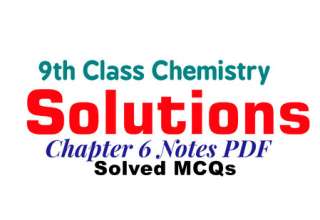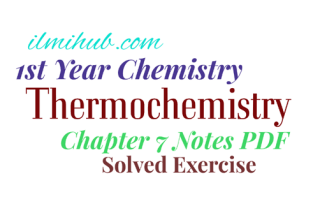In this post, I am sharing FSC 1st Year Chemistry Chapter 11 Short Questions PDF Notes for the students of FSC Part 1. The name of Intermediate Part 1 Chemistry Chapter 11 is Reaction Kinetics. So the students can download Reaction Kinetics Chapter Short Questions in PDF format from here. This file contains only 8 pages. These Chemistry Notes are for all the boards working under Punjab Board like Gujranwala Board, Lahore Board, Faisalabad Board, Multan Board, Rawalpindi Board, Sargodha Board, DG Kahn Board, and Sahiwal Board. Here are the complete 1st Year Chemistry Notes.
11th Class Chemistry Chapter 11 “Reaction Kinetics” Short Question PDF Download
What is energy of activation?
The minimum amount of energy in addition to the average energy of reacting molecules, which is required for an affective collision is called as activation energy
It is denoted by Ea
its unit are kJ mol-1
it will always have a positive value for a chemical reaction.
Increase in surface area will increase the rate of a reaction. Justify.
The increase in the surface area of the reactants increase the possibilities of atoms, ions or molecules of reactant to come in contact with each other. Hence rate of the reaction is increased.
Example;
Aluminum foil react with NaOH moderately when warmed, but powered AI reacts rapidly with cold NaOH and H2 gass is evolved with frothing.
2AI + 2NaOH + 6H2O ____________ 2Na[AI(OH)4] + 3H2
Difference between average rate and instantaneous rate of reaction.
| Average Rate | Instantaneous Rate |
| The rate of reaction between two specific time intervals is called the average rate of a reaction | the rate of reaction at any one instant during the interval is called instantaneous rate of reaction |
| Mathematically, Average rate = DC/Dt | Mathematically, Instantaneous rate = dx/dt |
| Average rate has a constant value for a particular reaction at a specific temperature | Instantaneous rate of a reaction change every instant during the reaction |
| It can be calculated after the completion of the reaction | It can be calculated during the chemical reaction |
what do you mean by chemical kinetics?
” The branch of chemistry which deals with the study of rate of chemical reactions and the factor that affect the rate of chemical reactions is called chemical kinetics”
These studies also throw light on the mechanisms of the reactions.
The rate of reactions and their control is very important in industry. They might be the deciding factor that determines whether a certain chemical reaction may be used economically or not.
Relevant Notes
- 1st Year Chemistry Chapter 1 Short Questions Notes PDF
- 11th Chemistry Chapter 2 Short Questions Notes PDF
- Fsc Part 1 Chemistry Chapter 3 Short Questions Notes PDF
- 1st Year Chemistry Chapter 4 Short Questions Notes PDF
- 1st Year Chemistry Chapter 5 Short Questions Notes PDF
- 11th Chemistry Chapter 6 Short Questions Notes PDF
- FSC 1st Year Chapter 7 Short Questions Notes PDF
- 1st Year Chemistry Chapter 8 Short Questions Notes PDF
- FSC Part 1s Chemistry Chapter 9 Short Question Notes PDF
- 11th Class Chemistry Chapter 10 Short Question Notes PDF





